
17 minute read
Guest Attorney
guest attorney The Florida Legislature’s Trend in Preemption of Local Regulation Perspective of a Local Government Attorney
by joseph a. adams, esq. and amanda l. swindle, esq. “The strength of free peoples resides in the local community. Local institutions are to liberty what primary schools are to science; they put it within the people’s reach; they teach people to appreciate its peaceful enjoyment and accustom them to make use of it. Without local institutions a nation may give itself a free government, but it has not got the spirit of liberty.” (Alexis de Tocqueville- Democracy in America) These were de Tocqueville’s thoughts on local government in observing American democracy. The idea that local bodies know their citizens’ needs better than a distant and centralized federal or state government has deep roots in American history. Florida formally adopted this concept in a revision to the state’s Constitution over 50 years ago, providing local governments with “home rule” authority to enact ordinances and regulations for any public purpose, unless preempted by the legislature. (Article VIII s 1 Fla. Const. 1968 Rev.) The Florida Legislature’s number of preemption bills has certainly ramped up in recent years. As of the writing of this article, there were 43 active bills including some kind of preemption language during the 2022 legislative session. The passage of a preemption bill inevitably leads to difficult legal and political issues the local government needs to resolve. First, local governments must determine the extent to which a subject matter is being preempted to the state. Express preemption is accomplished where a statute explicitly states a particular subject matter is preempted by state law. Implied preemption is recognized where the state legislative scheme of regulation is so encompassing that any local legislation on the subject matter would present a conflict with state law. The legislature’s preemption bills frequently fail to consider numerous unintended consequences of the new law. Florida consists of 66 counties, 412 cities, towns, and villages, and over 1,000 special districts, each with its own local issues and concerns. On the other hand, there are circumstances where one unified statewide regulation is preferred, such as the regulation of firearms and ammunition.
Following the passage of a preemption bill, local governments must pass, amend, or repeal ordinances to be consistent with state law. The local legislative action necessary to comply with a preemption bill usually leads to frustrated citizens who do not understand why they can no longer rely on their locally elected politicians to address important issues within their community. Below are just a few examples of recently enacted preemption bills from the Florida Legislature, and some of the local issues those bills have created.
HB 693/SB 1000 (2019) – COMMUNICATION SERVICES: This bill has created issues for local DOT permitting departments, which must retain enough staff to meet the permit review deadlines, but are not permitted to charge applicants any fees associated with this function. Additionally, the inability to deny a permit for a new facility when that facility could be co-located on an existing utility pole has led to public complaints about crowding of the rights-of-way. HB 1193/SB 474 (2020) – Deregulation of Professions and Occupations: While this bill includes a laundry list of professions where regulation has now been preempted to the state, one aspect of this bill that has created significant local concern is the preemption of mobile food vendors under newly enacted Florida Statutes Section 509.102. The statutory language is vague regarding the extent of the preemption, and many in the brick and mortar restaurant industry have expressed the belief it creates a double-standard for their competitors. While there are certainly areas where citizens may benefit from uniform, statewide regulations, there are many areas that are better dealt with at the local level, where citizens have access to local politicians and the local decision-making process through town hall, board, and city council meetings. The road to lobbying representatives in the capital for legislative change is much more cumbersome. When a preemption bill fails to adequately address the myriad of issues that arise, some of which are unique to a particular locality, it’s all the more difficult to address those issues on a state level.
Joseph A. Adams is an Assistant County Attorney at the Lee County Attorney’s Office. Joe received his J.D. with a Certificate in Environmental and Land Use Law from the University of Florida Levin College of Law in 2016 and has focused his practice in local government and land use law since that time.
Amanda L. Swindle is a Senior Assistant County Attorney at the Lee County Attorney’s Office. Amanda received her J.D. from the Florida State University College of Law in 2010 and her LL.M. in Taxation from the University of Florida Levin College of Law Graduate Tax Program in 2011. She is certified by the Florida Bar as an expert in City, County, and Local Government Law.
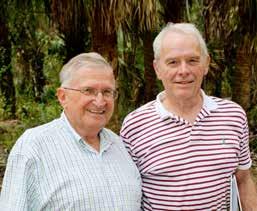
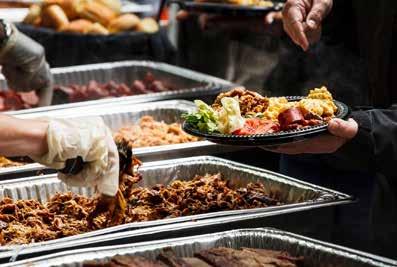

The Crawdads Sing Again in March
by the honorable robert branning and tom smoot, iii, esq.
March is again time for the Lee County Bar Association to enjoy savory BBQ and spicy crawdads. In relished anticipation, the Res Gestae reached out to the Honorable Robert Branning and Attorney Tom Smoot to reflect on the history and tradition of the Bench Bar-B-Q and Shrimp Boil.
Tom Smoot
The LCBA has an ancient tradition of annual feasts. Accounts have been banished to oral tradition, our earliest information coming from those who returned from the Second World War to study law and join the Bar in the late 1940s. The late Frank Pavese returned from conquering Axis forces in
Sicily (a separate story) and went to law school. He recounted that one of his earliest tasks as a lawyer was to organize the annual
“Hogwaller.” Hogwaller took place at the Orange River home of attorney and former state representative Norwood Strayhorn, a dean of the Bar. Then the Bar’s youngest lawyer, Pavese was instructed to inform Sheriff Snag Thompson of the date chosen for Hogwaller. Sheriff Thompson would handle everything else: liquor, steaks, and more liquor. Hogwaller lasted the better part of an afternoon and evening. It was an all-male event. There were no female Bar members in the 40s and 50s, and it was not the type of gathering to which one would ever consider bringing a date. The steaks were cooked over hot-burning orange and myrtle, and not for very long. The fire was managed by attorney and then-sitting state representative Walter Sheppard, who just years before had been with first squadron to spot the survivors of the Indianapolis. At the end of the evening, Sheriff Thompson, the consummate politician, led the guests safely home in a slow-speed caravan of partied-out drivers.
Hogwaller ultimately gave way to the times. By the 1960s, the newly formed Second District Court of Appeal sent its panel of judges to Lee County once or
2012 - Tom Smoot, Jr. (right)
The Crawdads Sing Again in March
twice a year, and it was the Bar’s duty to entertain them. Strayhorn appointed another dean of the Bar, Frank Alderman, Jr. (Bar Admission: 1933) to host the travelling jurists at his home in North Fort Myers. It was still a men’s club, and the steaks were still cooked by “The Greatest Generation”. Alderman was known to be fond of Apple Brandy, but not too much. At about 7:30 PM, he would routinely repeat his welcome to the visiting judges, confirm his liquor cabinet was there to be enjoyed by all, and head up the stairs to bed. His son, Frank Alderman III, however, did not usually turn in at dark. The style in which the Second District was hosted evolved with the times. The men’s club has become a co-ed Bar, drinking has given way to polite manners, and steaks yielded to pork barbeque which has yielded to shrimp.
From an Article In the Summer 2012 Issue of “The Circuit Times”
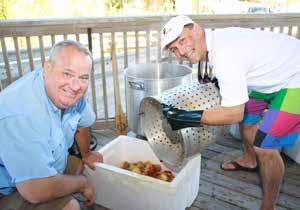
Long praised for his BBQ ribs, (Judge Jack) Lundy has stoked the fires of many a barbeque to create succulent ribs, beef and chicken at the Lee County Bar Association Annual BBQ. It was in 1986 when Judge Lundy was a practicing attorney with the law firm of Henderson Franklin, that he was first asked to be the “grill master” at the LCBA barbeque honoring the judges of the Second District Court of Appeals. Another attorney had been doing it when Jack Lundy took over the grill. His reign ended when Jack Lundy became Judge Jack Lundy in 1997. Three years ago Judge Lundy was brought out of retirement to judge (the first year) and then cook at a LCBA outing to honor retiring judges Rad Sturgis and Thomas Reese. Again, this year on March 31st Judge Lundy marinated and slow cooked ribs, beef and chicken at a barbeque in honor of soon-to-be retiring judges James Seals (Lee) and Franklin Baker (Collier). According to Judge Lundy creating his masterpieces takes a lot of time; it took 2 and 1/2 hours just to cut the ribs. He was up at 4am to start the fire which he tended to all day long. He seasoned the meat with his special home-made dry rubs before placing them over the fire to cook. The slabs of beef slow cooked for almost 10 hours!
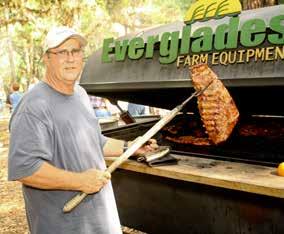
2012 - Judge Lundy
Judge Robert Branning
“‘What d’ya mean, where the crawdads sing? Ma used to say that.’ Kya remembered Ma always encouraging her to explore the marsh: ‘Go as far as you can – way out yonder where the crawdads sing.’ Tate said, ‘Just means far in the bush where critters are wild, still behaving like critters.‘” “Where the Crawdads Sing” by Delia Owens Where do the crawdads sing? Lee County, that’s where. In February 2016, my recollection is I got a panicked phone 2016 - Judge Branning and Jerry Von Gruben
call from then LCBA President Scott Atwood. I’m paraphrasing, but it went something like this: “Help us, Judge Branning. You’re our only hope.” Well, who am I, if not a humble servant of the law and extra-spicy mudbugs? We discussed the plan to have the Boil on Lovers Key in mid-March, a time when the weather usually cooperates and everyone is ready to relax. Jerry Von “I use Cajun spice as salt” Gruben, Atwood, and I hatched a plan to get the necessary shrimp and supplies down to the gazebo at Lovers Key. A couple of burners didn’t catch, and my attempt to have an electric pot for sausage and vegetables as a backup was more or less a dismal failure. Jerry, though, ever the culinary artist, managed to see us through and put on a spread that seemed to excite everyone. In all candor, it’s one of the best we’ve ever had – maybe because it was new, but also maybe because we knew there was no going back. From there, the Boil has gone through some refinement, and while the venue has changed, Von Gruben and I have gotten it down to a science. He’s an absolute pro when it comes to dialing in the right amount of spice, and each spring we fall into a groove of preparation. Pots are scrubbed, propane tanks are filled, and knives
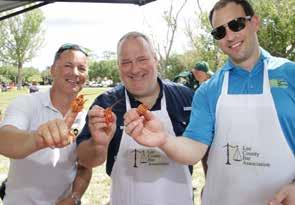
2017 - Jerry Von Gruben and Judge Branning 2018 - Judge Branning, Judge Sturgis, Jerry Von Gruben and John Webb 2019 - Jerry Von Gruben, Judge Branning and Judge Lundy
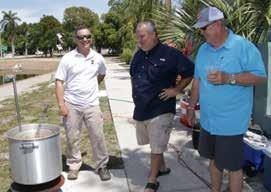
2019 - Jerry Von Gruben, Judge Branning and John Webb
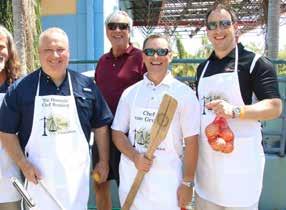
are sharpened. A little corn, a few potatoes, and enough spice to make you think your eyeballs are melting… these are our guidelines. Wear clothing you’re prepared to throw away or burn because you will get juice, or something, splattered over your once-pristine shirt. At the same time, if you show up wearing a plastic bib, prepare to be ruthlessly mocked. Table manners don’t exist at a crawfish boil. (Again, you’re all covered in sticky juices and guts and who knows what else.) But in addition to those unique sights, be prepared to hear a lot of grunting and slurping sounds. (I’m looking at you, John Webb.) Personally, I don’t think the Boil should ever be missed. I’m not afraid to say it; you haven’t truly lived until you’ve gotten your hands dirty with shrimp and crawfish parts. It’s an endlessly enjoyable social gathering that, much like the cooking itself, is not to be rushed but to be enjoyed with family and friends. So, come on by and visit; we’ll have the newspaper spread out on the tables, the lawn chairs set up, and we can begin the “process”. When this batch is finished, we’ll dump another pot...and another…. and another…
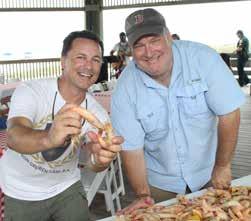
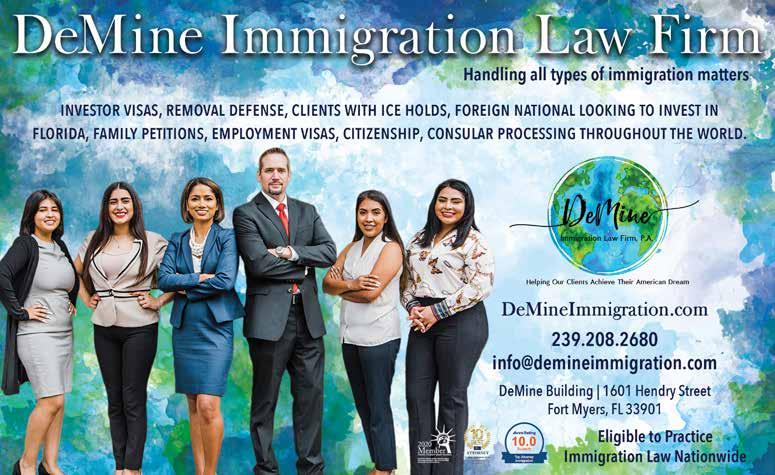
FLORIDA SUPREME COURT CONSIDERS ALLOWING FLORIDA REGISTERED PA LEGALS TO PROVIDE LIMITED LEGAL SERVICES
by keith grossman, esq.
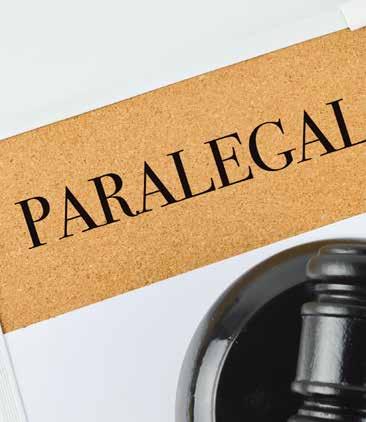
any legal jurisdictions in the United States are tackling the
M“access to justice” problem by questioning the way things have always been done. There have been discussions, and even pilot programs implemented, allowing for changes like nonlawyer ownership of law firms, fee sharing with nonlawyers and expansion of allowed paralegal services. It’s been reported low-income Americans receive inadequate or no professional legal help for 86% of the civil legal problems they face annually. It’s also been reported that 75% or more of the civil cases they handle involving divorce, custody, child support, guardianship, housing and consumer issues involve at least one self-represented litigant. Last year, the Florida Bar’s Special Committee to Improve the Delivery of Legal Services issued a report with the observation that access to affordable legal services is a critical problem. The report contained proposals that included allowing broader involvement of nonlawyers and expanding paralegal services. Specific to the expansion of paralegal services, the committee proposed approving a pilot program allowing Florida Registered Paralegals to provide limited legal services in specific areas and within a law office.
In December 2021, the Florida Bar Board of Governors rejected most of the proposals contained in the report. They voted, however, to allow a limited pilot program to utilize Florida Registered Paralegals in a more expanded way. This limited pilot program would be conducted within an existing legal aid organization and would limit the paralegals’ activities to residential landlord/tenant law on behalf of the tenant, and debt collection defense. The ultimate decision as to the recommendations contained in the report will be made by the Florida Supreme Court. At the time of this article, it is unclear how the Supreme Court will proceed. Other states, however, have acted allowing nonlawyer professionals to provide limited legal tasks. It is perceived the changes will lower the cost of legal services to the public. The nonlawyer professionals can provide a middleground service by performing legal work that may not be cost-effective for an attorney and may also be too complicated for an individual to tackle on their own. Arguably, it is the same distinction that exists between doctors and nurse practitioners.
utah
The Utah Supreme Court approved a program for Licensed Paralegal Practitioners (LPP) to practice in specific areas of law without direct involvement or supervision of an attorney. LPPs are mid-level advocates between administrative paralegals and attorneys. They handle cases involving family law, debt collection and landlord-tenant disputes and are licensed to file court documents and serve as mediators. They do not handle criminal cases or appear in court.
Utah Supreme Court Justice Constandinos “Deno” Himonas, who is retiring from the bench this month (March 22), heard economist Gillian Hadfield speak at a May 2018 conference about how modernizing the way the legal industry is regulated could increase access to justice, and he was immediately intrigued. Along with assistance from
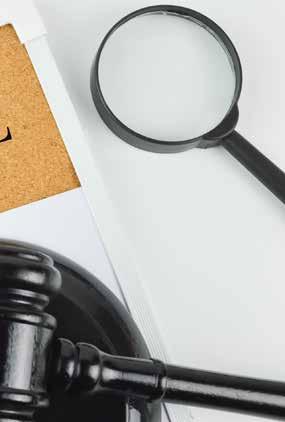
the then-president of the Utah State Bar, John Lund, the Utah Supreme Court was presented with other significant regulatory reforms in 2020, which they approved as a two-year pilot project.
Arizona
In Arizona, the Supreme Court’s Board of Nonlawyer Legal Service Providers started licensing legal paraprofessionals in November 2021. These paraprofessionals offer limited services without the supervision of an attorney. The limited areas of practice include family law, limited jurisdiction civil, limited jurisdiction criminal and administrative law. Before applying for a license, individuals must pass a core exam and an exam for their specific practice area.
California
In January 2020, the California State Bar’s Board of Trustees directed formation of a California Paraprofessional Program Working Group. The working group submitted its final report and recommendations to the Board in September 2021. A public comment period concluded on January 12, 2022. Under the plan, paraprofessionals would be allowed to represent parties in court in certain instances but not jury trials. Family law, housing, consumer debt, employment/income maintenance and collateral criminal would be among the practice areas in which the paraprofessionals could work, according to the proposal. The paraprofessionals would have to meet eligibility, educational and experiential training requirements; pass practice area-specific exams; and receive a positive moral character determination before securing a license. To be eligible to apply for licensure, a paraprofessional would need to have obtained a JD or an LLM, or be a qualified paralegal or legal document assistant as defined by state law.
The working group recommended a phased-in implementation approach in which paraprofessionals would be restricted to practicing in certain practice areas and geographic regions. The first eligible practice areas would be family, housing and collateral criminal matters.
Oregon
The Oregon Supreme Court is currently considering a proposal that would allow trained, licensed paralegals to provide limited legal services in family law and landlord/tenant cases. Kirsten Thompson, a senior circuit court judge in Oregon and the Chair of the Paraprofessional Licensing Implementation Committee for the Oregon State Bar explains, “Highly experienced paralegals would be able to seek licensure. They would have to have practiced in the area as a paralegal: at least 500 hours of their experience would need to be in family law; 250 hours in landlord tenant law; and 1500 hours in total, at least, to seek licensure. They would need to complete certain topics of continuing legal education. So, 20 hours of specific training. And then they would need to go through a character and fitness application, as attorneys do at this point, prior to licensure.” Other states that are possibly exploring similar programs as outlined above include Colorado, Illinois, Nevada, New Mexico, and New York. Washington was actually the first state in the country to offer a program licensing a nonlawyer professional, and it was only available in family law. An individual could become a limited licensed legal technician known as a TripleLT. Christy Carpenter holds one of those licenses, and she says, “I can’t go and speak for a client before the court. But I prepare my clients well. I prepare talking points. And I think that educating the clients is something that they don’t normally get if they’re represented by an attorney. So, I feel like they are more empowered to know where their case is going really because you know, we TripleLTs provide the law to the client, they explain the forms and I think that maybe that’s not often done by attorneys. They simply just do the work and maybe [don’t] explain it as much, but we have limited scope. We have to prepare our clients to go forward on their own in court. And so, I think we do a very good job of that.” The Washington Supreme Court did sunset the program in June 2020, citing cost concerns and an apparent lack of applicant interest. However, since June 2020, the Washington Supreme Court has decided to allow as many TripleLT candidates as possible to complete all licensing and admission requirements by a July 31, 2022, deadline. All TripleLTs already licensed and any new ones who meet the deadline to be licensed will continue to be licensed after the sunset. Carpenter says there were about 66 active TripleLTs and 200-300 potential TripleLTs working towards licensure when the program was sunsetted. With the support of the Florida Bar Board of Governors and information gained from other states’ experiences, the Florida Supreme Court will now decide whether to allow Florida Registered Paralegals to provide limited legal services.










